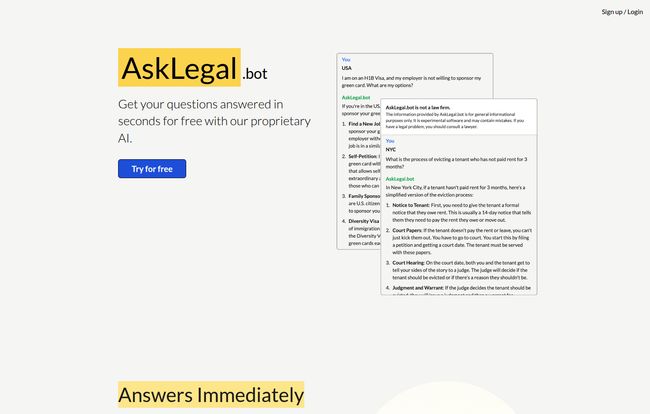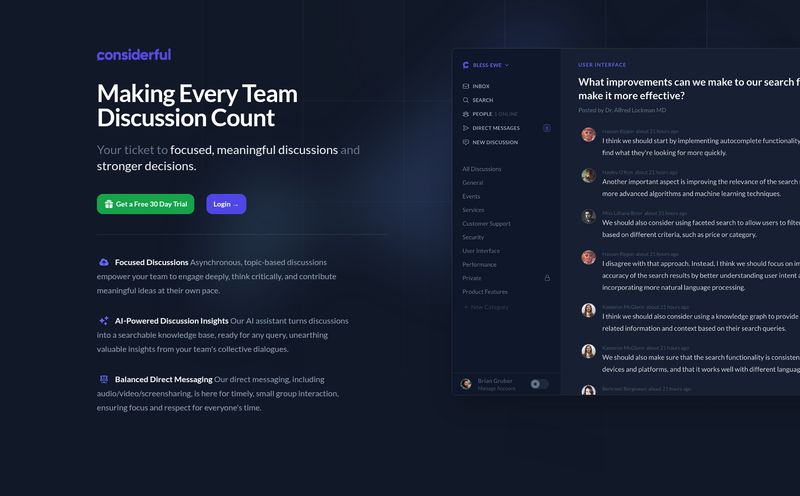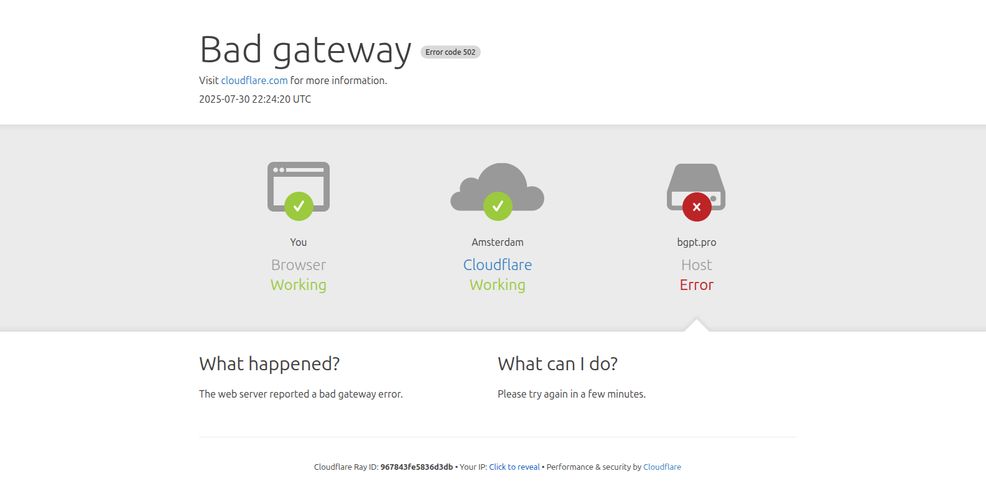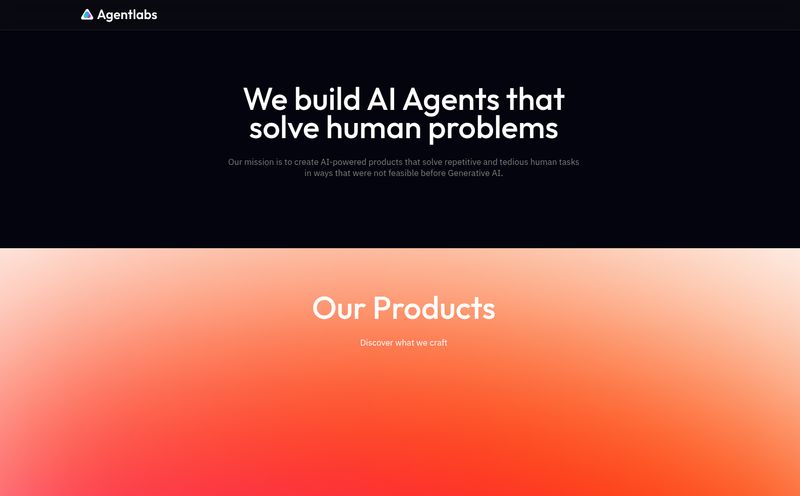The moment you even think you need a lawyer, you can almost hear the cha-ching of a cash register. It’s this weird mix of dread and confusion, trying to figure out if your problem is a five-minute-fix or something that will swallow your savings whole. For years, the legal world has felt like this exclusive club with a high price of admission. You either pay up, or you stay out.
As someone who lives and breathes tech, SEO, and the constant churn of new platforms, I've seen AI try to tackle everything from writing code to composing music. So when I stumbled upon AskLegal.bot, a tool promising free, instant legal answers, my professional skepticism immediately kicked in. Another AI promising the world? I’ve seen that movie before. But the idea of making legal information accessible to everyone… well, that’s a story I wanted to see the end of.
So, I cleared my afternoon, grabbed a coffee, and decided to see if this bot was a genuine step forward or just another gimmick in the ever-growing AI hype cycle.
First of All, What is AskLegal.bot?
In simple terms, AskLegal.bot is an AI-powered chatbot designed to answer your legal questions. You type in your problem, and it gives you a straightforward answer. The big headline here is that it’s completely free. No sign-ups that secretly ask for your credit card, no “free trial” nonsense. Just a clean, simple interface with a chat box waiting for your troubles.
The platform claims to offer instant insights, tailored guidance, and a confidential, secure environment. It covers a pretty wide range of common legal areas: Criminal Law, Contract Law, Family Law, Employment, Real Estate, and Landlord-Tenant issues. Basically, many of the things that send regular folks into a panic search on Google at 2 a.m.
My First Impressions and a Quick Test Drive
Landing on the site, I was immediately struck by how clean it is. There are no flashing banners, no pop-ups, no confusing navigation. It's just a prompt: “Get your questions answered in seconds.” I appreciate that. It feels less like a corporate sales pitch and more like a utility.
To put it through its paces, I decided to role-play a common, stressful scenario I’ve seen friends go through. I used the example right from their homepage—a tenant who hasn't paid rent in three months. I typed something similar into the chat:
“I am a landlord in NYC and my tenant has not paid rent for 3 months. what are my options?”
The response came back in seconds. And I have to say, it wasn't bad. It was actually… pretty good.

Visit AskLegal.bot
It didn’t just give me a vague answer. It broke down the process into clear, numbered steps: Notice to Tenant, Filing an Eviction Lawsuit, and Judgment and Warrant. This is exactly the kind of structured, foundational knowledge someone in that situation needs. It turns a giant, scary problem into a manageable series of actions. Most importantly, it included this golden sentence: “The information provided by AskLegal.bot is for general informational purposes only and does not constitute legal advice. If you have a legal problem, you should consult a lawyer.”
That disclaimer is everything. It shows the tool understands its own limits.
The Big Question: Can You Trust an AI with Legal Advice?
This is the real heart of the matter, isn't it? An AI can be fast and free, but the law is a minefield of nuance, interpretation, and local quirks. So where does a tool like this fit in? I think it’s a classic case of pros and cons.
The Upside of Instant Legal Guidance
The most obvious advantage is accessibility. The cost of just consulting with a lawyer can be a huge barrier for so many people. A tool that provides a solid starting point for free is, in my opinion, a massive win for the little guy. It helps level the playing field just a bit. It’s not about replacing lawyers, but about empowering people to understand their situation before they even speak to one.
Then there's the sheer convenience. Your boss makes a weird comment about your contract at 5 PM on a Friday? You can get a general idea of your rights right then and there, without stewing in anxiety all weekend. It’s about turning down the panic meter and turning up the clarity. It demystifies the intimidating jargon and processes that the legal system is famous for.
Holding Back the Gavel: The Clear Limitations
Now for the reality check. While I’m impressed, I'm also cautious. The biggest issue is what I call the “nuance problem.” An AI, no matter how well-trained, can't understand the specific context of your case. It can’t read the judge’s mood, it doesn’t know the unwritten rules of your local courthouse, and it can’t pick up on the critical details you might not even know are important.
I like to think of it this way: AskLegal.bot is like a legal GPS. It can show you the most direct route from Point A (the problem) to Point B (a resolution) on a map. But it can’t tell you about the unexpected roadwork, the notorious local speed trap, or the fact that the bridge is out on Tuesdays. For that, you need a seasoned local driver—a real, human lawyer.
Another concern, from a tech perspective, is the “black box” nature of the AI. The website doesn't provide a ton of detail on what data its AI was trained on. Is the information based on federal law? Does it account for state-by-state variations? How often is it updated? For general guidance it's fine, but for anything specific, this lack of transparency is a reason to be careful.
So Who is This Tool Actually For?
After playing around with it for a while, I have a pretty good idea of the ideal user for AskLegal.bot. This isn't for a corporation facing complex litigation. It’s for everyday people with everyday problems.
- Students trying to understand their rights in a rental agreement.
- Small business owners with a general question about contracts before they hire a professional to draft one.
- Landlords and tenants who just need to know the basic steps of an eviction or a dispute.
- Anyone who feels completely lost and just wants a confidential, no-judgment place to ask a “stupid question” to get their bearings.
It's a first-stop-shop. A pre-research tool that arms you with enough knowledge to ask a real lawyer the right questions, which can save you a ton of time and money in the long run.
The Cost of Free Legal AI?
It's free. Totally, 100% free. That alone made me raise an eyebrow, because as we all know in the world of tech, if you're not paying for the product, you are the product. So what's the catch? The site is big on its confidentiality and security promises, which is reassuring. My best guess? It could be a long-term play. Perhaps they plan to introduce premium features down the line, or maybe it functions as a way to gather anonymized data on common legal questions to build even better AI models. Or maybe, just maybe, it's a genuinely altruistic project to democratize legal information. Whatever the reason, for now, the price is unbeatable.
My Final Verdict on AskLegal.bot
So, would I use it? Yes. Absolutely.
But I would use it for what it is: an incredibly powerful starting point. A way to get the lay of the land. It’s a fantastic tool for initial research, for calming initial fears, and for understanding the basic vocabulary and processes you’re up against. It’s a tool for empowerment.
I went in a skeptic and came out a… well, a cautious optimist. AskLegal.bot isn't going to replace your lawyer, and it shouldn't. But it could very well change how we all approach our legal problems. It lowers the barrier to entry, and in a field as walled-off as law, that’s a pretty big deal. Just use it wisely, and always consult a qualified human professional for a real-world problem.
Frequently Asked Questions about AI Legal Tools
- Is AskLegal.bot a real lawyer?
- No, absolutely not. The platform is very clear that it provides general information and does not constitute legal advice. It's an AI tool, not a licensed attorney.
- Is my information safe with AskLegal.bot?
- The website states that it ensures confidential and secure discussions with data security and privacy measures. However, as with any online platform, you should avoid sharing extremely sensitive personal identifying information.
- How much does AskLegal.bot cost?
- It is currently completely free to use. There are no hidden fees or subscription costs mentioned on the site.
- Can AI legal tools like this replace human lawyers?
- Not in the foreseeable future. AI can handle information retrieval and process explanation, but it can't handle the nuance, strategy, and human element of a legal case. Think of it as a research assistant, not a replacement.
- What kind of questions are best for AskLegal.bot?
- General, informational questions are best. For example, "What are the steps to start a small business?" or "What are my basic rights as a tenant?" are great questions. Avoid asking it to review a long contract or provide a definitive strategy for a complex, ongoing case.
- Is the legal information from AskLegal.bot up to date?
- This is a valid concern. While the AI is likely trained on a vast dataset, laws change frequently. This is another key reason why its information should be treated as a starting point and always verified with a current, local legal professional.
Conclusion
The rise of tools like AskLegal.bot is an exciting development. It signals a shift towards making specialized knowledge more accessible to everyone, not just those who can afford it. While the dream of a fully-fledged AI lawyer is still the stuff of science fiction, this platform is a practical and genuinely useful tool for today. It’s not perfect, and it has its limitations, but its ability to provide clear, immediate, and free guidance is a game-changer. It’s a smart tool for a smarter, more informed client. And that benefits everyone in teh long run.
Reference and Sources
- AskLegal.bot official website: https://asklegal.bot
- ABA Journal - "AI in the Legal Profession": A look at how AI is being integrated into the legal industry.



